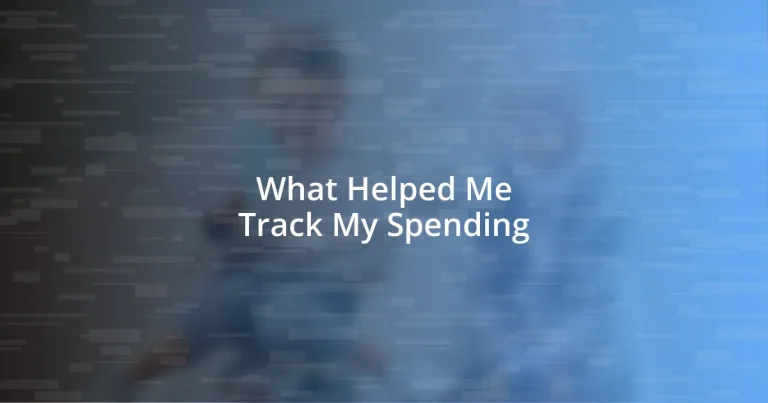Key takeaways:
- Finding a tracking method that resonates with you, such as visual budgeting apps, enhances engagement and motivation in managing finances.
- Regularly analyzing spending habits and tracking expenses leads to increased financial awareness and more mindful purchasing decisions.
- Establishing realistic financial goals and being adaptable with your budget fosters a sense of accomplishment and better alignment with personal values.
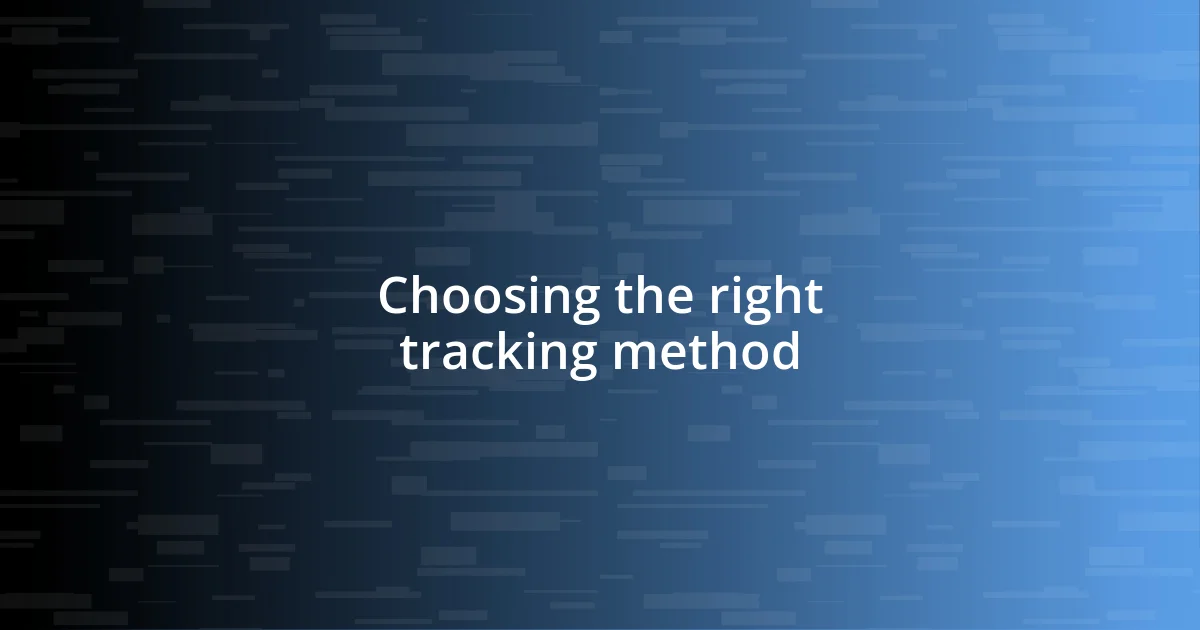
Choosing the right tracking method
Choosing the right tracking method is essential for understanding where your money goes. I remember when I first started tracking my spending, I used a basic spreadsheet, but I found it tedious and easily lost interest. Have you ever felt overwhelmed by numbers on a screen? That’s exactly how I felt until I switched to a user-friendly app that turned tracking into a game rather than a chore.
When selecting a method, it’s crucial to consider what feels intuitive to you. For instance, I’ve always been a visual person, so using a budgeting app that offered colorful graphs made all the difference. Have you ever noticed how visuals can transform dry data into engaging insights? Seeing my spending habits laid out in vibrant pie charts motivated me to stick with the program.
In the end, it’s about finding a method that resonates with you personally. Dividing my expenses into categories and setting clear goals helped me experience a sense of control that I hadn’t felt before. Ask yourself: what sparks joy in your tracking process? Embracing a method that aligns with your preferences can make the journey toward better financial habits both enjoyable and rewarding.
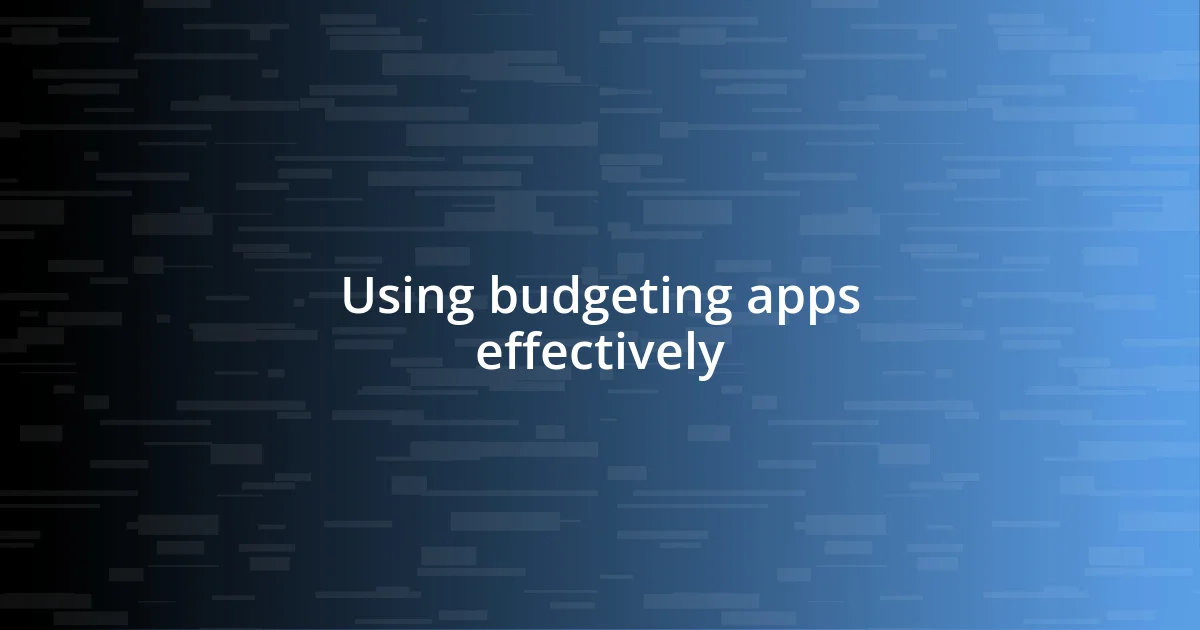
Using budgeting apps effectively
Using budgeting apps effectively requires more than just downloading one. I remember the first app I tried seemed promising, but I wasn’t using its features to their full potential. It wasn’t until I started customizing categories that I began to see real benefits. Adjusting the categories to reflect my personal spending patterns made my budget feel more relevant. When you make the app work for you, it transforms the experience—suddenly it’s less about following rules and more about creating a personalized financial roadmap.
Here’s how to maximize your budgeting app experience:
- Set specific goals: Define what you want to achieve, whether it’s saving for a vacation or paying down debt.
- Track every expense: Make it a habit to input transactions daily; this keeps your spending aligned with your goals.
- Analyze trends: Regularly check the reports and insights your app provides. This helps you understand your spending habits better.
- Utilize reminders: Set alerts for bill payments and budget limits; these nudges keep you accountable.
- Engage with the community: Some apps offer forums or social features; sharing your journey or seeking advice can enhance motivation.
When I started integrating these strategies, tracking my spending felt less like a chore and more like an empowering journey. It’s exhilarating to celebrate small victories along the way, and these apps can truly help put you in the driver’s seat of your financial future.
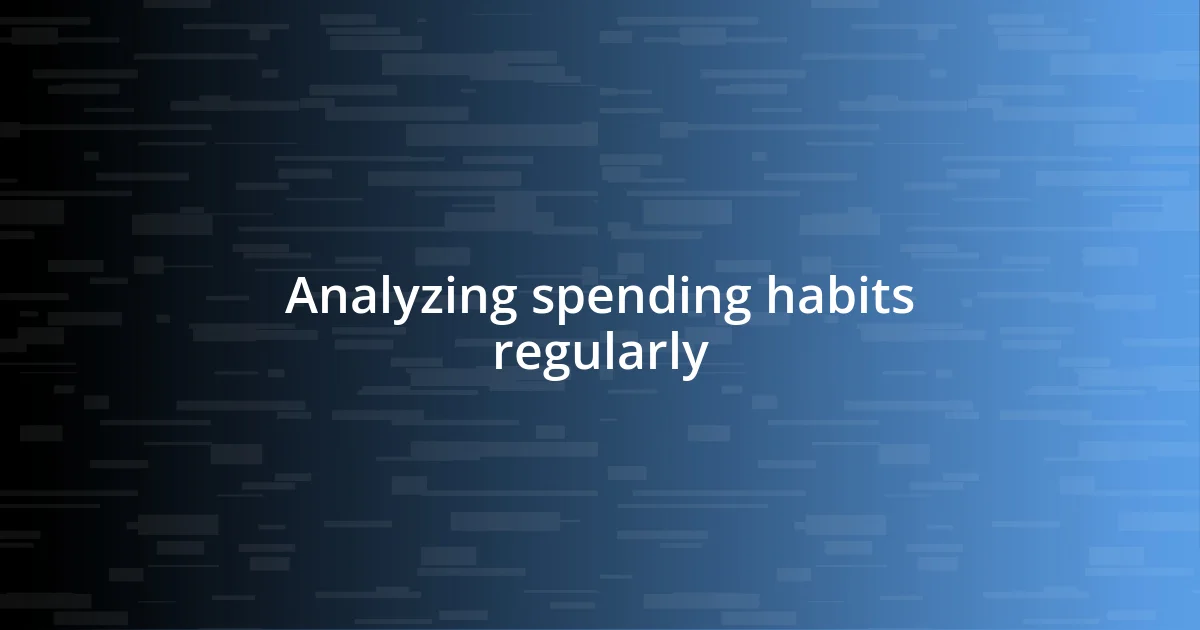
Analyzing spending habits regularly
Analyzing my spending habits regularly transformed my financial journey in unexpected ways. At first, I would glance at my monthly summary without a second thought. But once I started reviewing my transactions weekly, I noticed patterns that surprised me. I remember discovering that my impulges were leading me to spend more on takeout than groceries. It was like turning the lights on in a dim room; suddenly, everything was clearer.
What really struck me was the emotional connection to my spending. Each expense told a story, revealing what I truly valued—from dinners out with friends to those late-night online shopping sprees. Regular analysis helped me reflect on whether those expenses aligned with my goals and well-being. Have you ever paused to consider how certain purchases make you feel? For me, identifying those triggers led to mindful spending, and I felt proud every time I chose to invest in experiences rather than materialistic whims.
Overall, I found that dedicating time to review my finances didn’t just deepen my understanding—it also enriched my life. By recognizing unnecessary spending, I could channel resources towards passions and goals that truly mattered to me. Keeping an open mind during these reflections allowed me to adjust and improve. Can this kind of reflection spark change in your own spending habits?
| Pros of Regular Analysis | Cons of Ignoring Analysis |
|---|---|
| Identifies wasteful spending | Continues poor financial habits |
| Increases financial awareness | Lack of financial goals |
| Encourages mindful purchasing | Missed opportunities for savings |
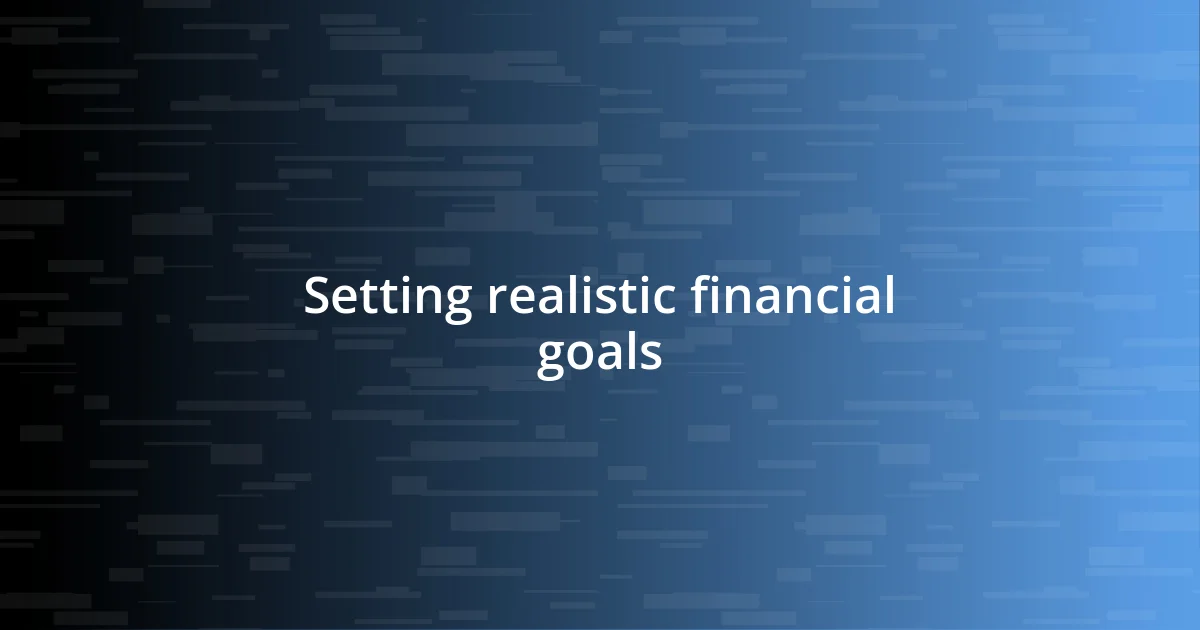
Setting realistic financial goals
Setting realistic financial goals is one of the most crucial steps in my budgeting journey. When I initially set out to save, I aimed too high, envisioning a luxury vacation within a few months. However, after reassessing my objectives, I realized that breaking it down into smaller, achievable steps, like saving a modest amount each month, made a significant difference. It’s about setting goals that feel attainable, which kept my motivation alive.
I remember when I started saving for a new laptop. Rather than pinning down an enormous amount right away, I created a clear timeline. By committing to save a smaller amount each paycheck, I not only felt less overwhelmed but also celebrated each milestone along the way. Have you ever noticed how hitting small targets can fuel your drive? It’s all about building that momentum gradually, turning a seemingly daunting goal into a series of satisfying achievements.
Finding the balance between ambition and realism can be tricky, but it’s undeniably rewarding. I genuinely believe that if you set goals that resonate with your values and lifestyle, you’re more likely to stick with them. This approach doesn’t just help in keeping you on track financially; it encourages a sense of accomplishment that enriches your overall experience. Reflecting on my journey, I’ve learned that the path to financial stability isn’t a sprint; it’s a steady, enjoyable marathon that I’m excited to run.
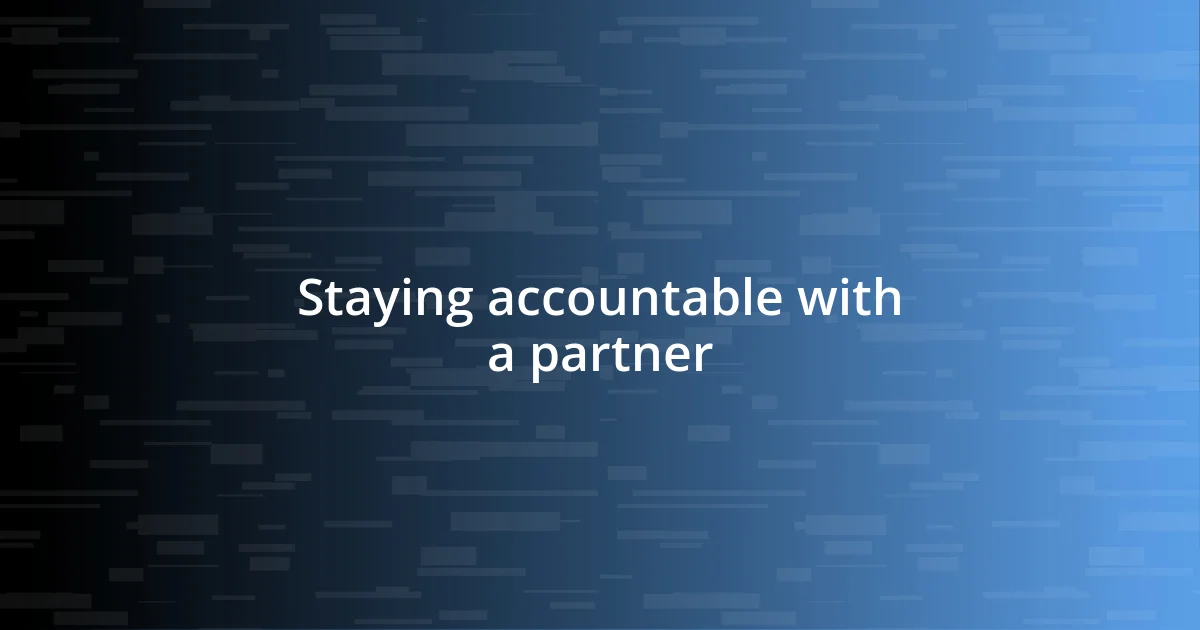
Staying accountable with a partner
In my experience, having a partner to hold me accountable has been a game-changer in my financial management. When I embarked on my spending-tracking journey, I invited a close friend to join me. We would share our weekly budgets and spending habits, creating a safe space to discuss our challenges. It felt less daunting to tackle my finances because I wasn’t alone, and honestly, having someone to celebrate the small victories with is incredibly motivating.
One particular evening, I remember sitting down with my friend over coffee. We both laid out our weekly expenses, and it was eye-opening to discuss our choices freely. I was amazed at how her perspective illuminated my blind spots—she pointed out that those “little” purchases add up over time. Has opening up to someone ever changed your outlook? For me, it offered not just accountability but deeper insight into my spending patterns.
Moreover, the emotional boost of sharing my goals with a partner was significant. Knowing that someone was rooting for my success made me more committed to my financial plan. We encouraged each other, whether it was resisting a shopping trip or finding creative ways to save. I began to realize just how vital it is to surround ourselves with like-minded people. How about you? Have you thought about enlisting a friend or family member to keep you accountable? It could be the key to transforming your financial habits.
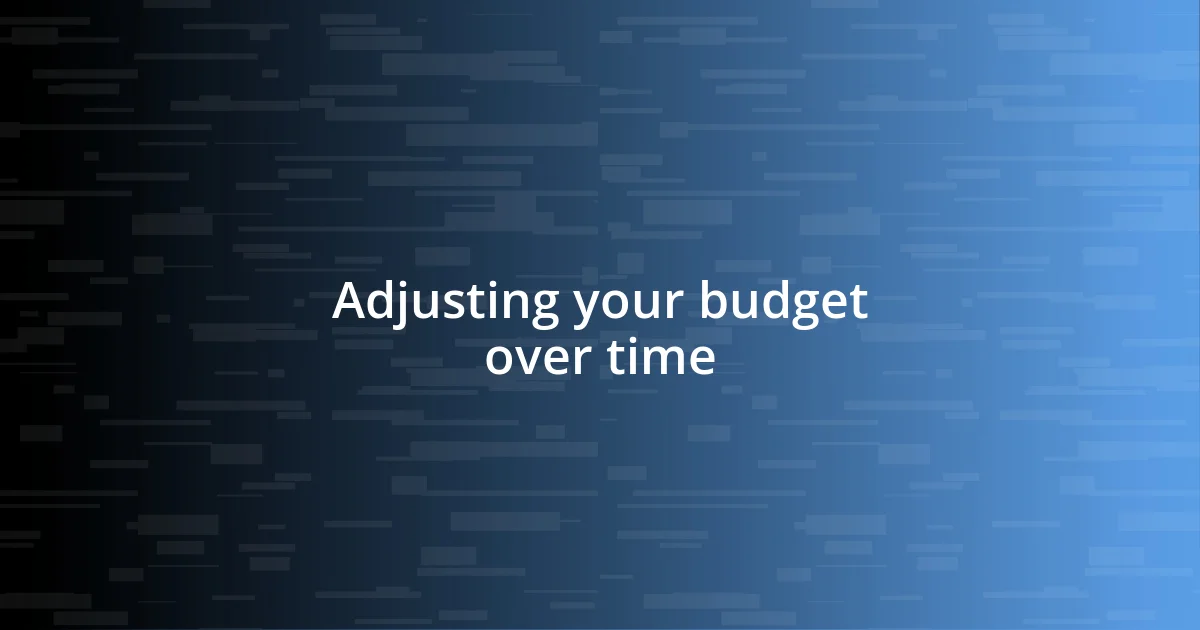
Adjusting your budget over time
Adjusting your budget isn’t just about numbers; it’s also about emotions and experiences. I remember a particular month when unexpected car repairs threw my budget into chaos. Instead of panicking, I sat down and re-evaluated my allocations, shifting funds from entertainment to cover the repair costs. How many of us have found ourselves in similar situations, realizing that flexibility can ease stress? This taught me that a budget should be a living document, one that evolves with my circumstances.
Over time, I discovered that I needed to tweak my budget as my priorities changed. For instance, when I adopted a new hobby that required supplies, I had to find spaces to allocate funds without derailing other goals. It felt empowering to make those adjustments, much like rearranging furniture in your home for a fresh perspective. Have you ever adjusted your budget to fit a new passion? I found that this adaptability not only kept me motivated but also made the journey feel more enjoyable.
The key is to embrace change rather than resist it. I often reflect on how my spending habits shift with seasonal changes—summer vacations can lead to unplanned expenses, for example. By anticipating these fluctuations, I learned to create a flexible budget that accommodates those variations. Maintaining a dynamic budget means being proactive, which ultimately helps me feel more in control of my financial journey.












